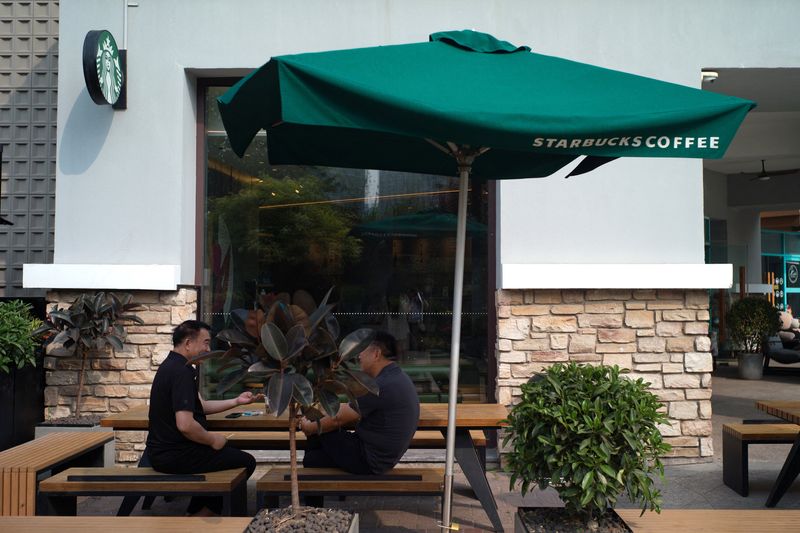By Casey Hall and Sophie Yu
SHANGHAI (Reuters) - As Starbucks (NASDAQ:SBUX) faces stiff competition for its brew in China from fast-growing, low-cost rivals who have chipped into its market share, the coffee chain is increasingly being dragged into a price war it says it wants to avoid.
The stakes are high for Starbucks, which has come under growing pressure from investors recently due to weaker sales in its two biggest markets - the United States and China.
While the Seattle-based company has got its work cut out in the world's second-biggest economy, where its rival Luckin Coffee (OTC:LKNCY) pipped it to the top spot on annual sales for the first time in 2023, management is convinced it does not need to get into a race to the bottom on prices.
"We are not interested in entering the price war," Starbucks' China CEO Belinda Wong said in January. "We are focusing on capturing high quality but profitable, sustainable growth." Those sentiments were repeated by founder Howard Schultz on a visit to Shanghai in March.
However, analysts, Reuters checks and Chinese consumers posting on social media point to an increase in discount coupons being offered by Starbucks through its own mini-programs, as well as via the coffee-maker's livestreams on Douyin, and third-party delivery platforms popular for ordering coffee.
In effect, Starbucks has made it relatively easy for Chinese consumers to buy its most commonly ordered coffees with 30% discounts or two-for-one coupons without dropping their listed prices, sliding down a slippery slope of increased discounting towards a potential price war.
While Reuters was unable quantify just how much Starbucks' use of discount coupons has increased and the firm declined to comment on its coupons policy, these types of discounting practices were once a rarity from the U.S. coffee maker. In 2024, however, they have become easily available.
Walker Shen, 38, is an office worker from Shanghai who frequently uses discount coupons to buy his daily coffee. He has noticed an increase in push notifications from Starbucks in recent months offering him 30% off coupons.
"I think less people are drinking Starbucks now," Shen said, adding that "most people aren't that demanding when it comes to quality," meaning fewer consumers were willing to pay a premium for Starbucks.
The emergence of a price war in the coffee sector in China comes amid a persistent deflationary environment, exacerbated by weak consumer sentiment as the economy struggles to recover and wages stagnate.
Unfortunately for Starbucks, says Jason Yu, greater China managing director of market research firm Kantar Worldpanel, it doesn't really have a choice but to compete to some degree on price in a market where low cost battles have become "the new normal".
"Strengthening the promotional offers and increasing the intensity of their promotions, being very active on social media, are essential moves to maintain their position so market share is not further eroded," he added.
In second quarter results released at the beginning of May, Starbucks said same-store sales in China - its second-largest market - fell 11%, prompting it to slash annual sales forecast.
The coffee chain had a 13.6% market share of China's cafe and bar market in 2022, according to the most recent available data. Daxue Consulting, a market research firm, estimated China's roast coffee market at $11.7 billion in 2023 and projected it to grow to $13.25 billion by 2025.
Starbucks remains more discerning in its approach to distributing discount coupons than others, says independent food and beverage analyst Zhu Danpeng.
"Starbucks will do promotions, but their promotion volume will be small, they will be in a specific period of time, or for some specific products," he said.
Starbucks China CEO Wong last year said "Deep Brew", the firm's AI data analytics engine, would allow it to pitch discounts to "the right customers at the right time" in China, though the firm declined to comment on the use of Deep Brew as part of its current strategy.
COFFEE FOR BEANS
The list price of a large Luckin latte at 29 yuan ($4.00) is not far off Starbucks' latte price (33 yuan), but Luckin actually often sells lattes at 9.9 yuan with a widely-available coupon.
Offerings from other competitors are even cheaper, with Cotti, a chain launched by former Luckin Chairman Charles Lu, offering Americanos for 8.8 yuan with a coupon and KFC's KCoffee allowing members to buy 5 yuan coffees for 30 days on a 10-yuan membership fee.
Helped by its steep discounts and quicker store expansion - with 18,590 stores already more than double the 9,000 Starbucks says it will open in China by 2025 - Luckin revenue reached 24.86 billion yuan ($3.45 billion) in 2023, surpassing Starbucks' comparable annual sales of $3.16 billion in China.
Though price will be an important factor in consumer decision-making for the foreseeable future, Starbucks won't beat its competition in a race to the bottom, Kantar's Yu says, adding that the American firm should continue with its strategy of offering a premium in-store experience its competitors can't match.

"Starbucks needs to compete on price but not only compete on price," he said. "They need to lead in innovation, lead in the conversation about coffee and lead in creating emotional value for consumers, or they will lose out more to the local competition."
($1 = 7.2444 Chinese yuan renminbi)